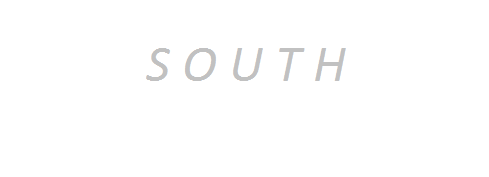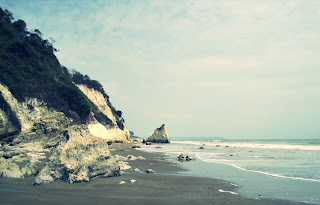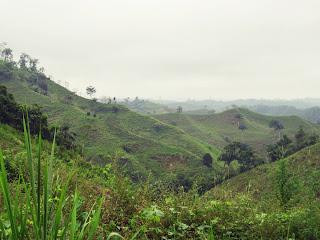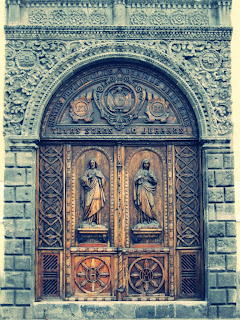I had breakfast in the restaurant of the hotel and then packed up the bike. Whether I had liked Canoa or not I had to leave. There was no bank in town and I was out of cash. My plan was to ride further south along the coast to Bahia de Caraquez (known simply as Bahia in Ecuador) and perhaps stay there for a time if I liked it. It was a city both on a bay and on the Pacific. I had also been told that there I would find a camping store with replacement gas canisters for my stove. I was getting worn out eating all the rice and fried plantains and was looking forward to hot oatmeal for breakfast and pasta dinners I could make for myself.
I left Canoa and turned onto the E15 heading south. There was some climbing and it was overcast and cool and wet but there was little traffic and the road cut inland. Beyond the hills I knew there was the ocean and then after more climbing and descending the road came back to the ocean. Along the road was a narrow cement path with a low wall that separated it from the asphalt and I rode along this cement path towards the town of San Vicente.
Not having to worry about passing cars, my mind was wandering as I rode. Then ahead I saw a shirtless and shoeless guy walking towards me on the cement path. He was making no effort to get out of my way and I didn’t like the look of him. I saw nothing in his hands and began to slow as I neared him. Still, I was thinking of the delinquents of the coast I had been warned about. “Agua! Agua!” he said and I began to coast towards him as if I was going to stop and he stepped to the side.
But I had no intention of stopping or giving him anything. Nobody blocked my way and then demanded things of me while I was riding. I started to pedal. “Agua!” and he grabbed my arm and I threw him off and whacked his hand away. “No me toques!” and I added some very vulgar expressions I had learned in Colombia. He chased me for a second and I heard him behind me but I was too fast for him. Perhaps he had genuinely wanted water. But he had gone about it entirely the wrong way. He didn’t know how lucky he was that he hadn’t stopped me by grabbing my arm. I would not have hesitated to hit him or even go for my knife packed for quick accessibility in my rear pannier.
There was construction on the road into San Vincente and though I rode carefully through it mud kicked up and dirtied my drive train. The road went through the town along the Bay of Caraquez and across the water I could see the white buildings of Bahia and the long bridge that connected San Vincente to the city. The sun was out now and it was hot and I crossed the bridge on a bike path into the harbor area of Bahia. There were many boats tied up and I followed the calle Bolivar towards the center of the city.
I had an address for a cheap hotel but when I asked about rooms was told prices were $25 a night. Apparently the hotel had been recently remodeled. I asked about something more economical and was directed a block down the street to a dingy, dark, windowless place with $10/night rooms. There was a large mural of the ocean and palm tree on the wall and televisions blasted from the other rooms. Just my kind of place.
I cleaned up and went into the city to look for camping stove gas. My search went as it had gone in other places. People looked at me strangely and said nothing. When I explained again what I was looking for they sent me on to another shop in which I was again looked at strangely. I gave up my search and went to the beach. I didn’t like Bahia much either and would leave tomorrow for the fishing village of San Clemente.




















































